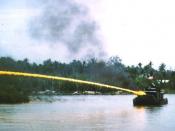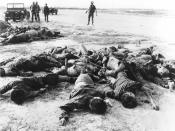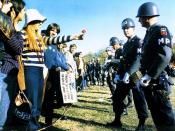The Heaviness of the Vietnam War In all wars, whether justifiable or not, whether there is a moral benefit or not, or whether unavoidable or not, there is always human suffering on all parties involved. A war affects everyone involved in the conflict either directly or indirectly. Frequently, the horrors of war directly affect noncombatant civilian populations surrounding the areas of military campaigns. Always, family units are indirectly affected by having family members in the Armed Services with the military volunteers or draftees returning in body bags or never returning. However, at the very least, for soldiers in the battlefields, directly involved in the hostilities, the baneful suffering is usually physical, emotional, psychological, and frequently, death. For the men that do survive death, there is always a price to pay, which is a transformation from what they were before to what they unwillingly must or will become due to the pressures of the war.
Moreover, if the grounds for the war are ambiguous and hence soldiers do not comprehend it or acquire a sense of purpose or mission, as was in the Vietnam War, the toll on the human spirit is even greater. Acknowledging this, Tim O'Brien in his vignette, " The Things They Carried," which is about a platoon of soldiers and their experiences and emotions brought by the controversial Vietnam War, shows how soldiers become desensitized to the death of others, and acquire an induced violent nature while also making an effective anti-Vietnam War statement.
In his narration of the story, O'Brien consciously juxtaposes the emotional burdens the soldiers carry, as they march through the Vietnam jungle, with descriptive passages of the weaponry, its weights, and accouterments of war, in order to bring a sense of weight and focus to the wearing down of emotions that results in...


